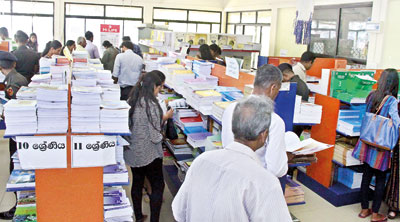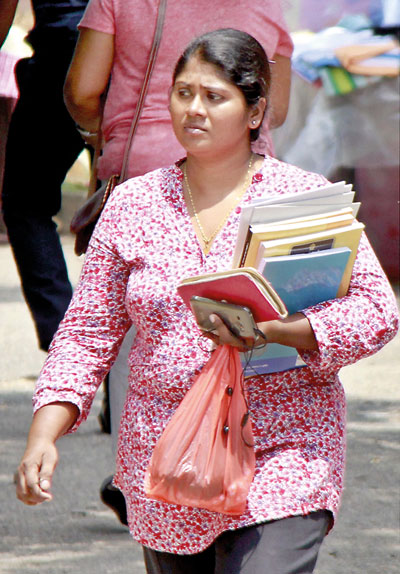News
A textbook case of inefficiency at Education Ministry
Shakila’s son, Thirunaka, entered Grade 5 this year excitedly expecting new school textbooks or at least used books in satisfactory condition but found that she and her son were victims of the mess caused by printing delays of schoolbooks.

A rush for text books: The Education Publications Department's sales centre at Isurupaya, Battaramulla. Pix by Indika Handuwala
“Thirunaka’s school [in a Colombo suburb] said that because there was a shortage of textbooks it was compelled to give out used books, with most in dire condition.
The Sinhala and Buddhism books were so torn, damaged and written all over that they couldn’t be used at all,” said Shakila, 37, from Hokandara.
She had come to Education Publications Department’s sales centre at the Education Ministry offices in Battaramulla to buy textbooks rather than have her son struggle with the poor-quality volumes given out by the school.
This year, the government allocated about Rs. 4,000 million for the printing and distribution of about 43 million school textbooks in 410 categories.
“Last year, authorities made the mistake of printing only 50 per cent of the books required and saying the balance should come from used stock. By ordering schools to re-use as much as 50 per cent of stock, with some books in dire condition, education authorities knew parents would opt to buy textbooks to please their children,” the Ceylon Teachers’ Union charged.
Union secretary Joseph Stalin said there was a shortage of about one million textbooks in December.

Shakila:Buying new books for her son due to poor quality books distributed by the school
“Most students did not receive textbooks before the school holidays last December,” he said. “This year, parents and teachers are struggling with the delay in textbook printing. It was reported in many schools that some students were receiving new books while others were told to re-use books that were not in good condition. The past few weeks saw hundreds of parents standing in queues at the Education Publications Department bookshops,” he said.
He said when unions questioned the reason for printing the book price at the back of each textbook, they were told it was to show the students the value of books.
Mr. Stalin alleged this was a move to reduce expenditure on free education, encourage the purchase of books and initiate a voucher system for textbooks similar to that for uniform material.
“This year, the Education Publications Department advertised on January 30, 2018 calling for tenders for the printing of extra textbooks. It gave the deadline as February 15, 2018,” said he said.
The Commissioner of General Education Publications, I.M.K.B. Illangasinghe, acknowledged that textbook shortages remain.
“The delay was caused by the Department of Government Printing (Government Press) which was given the printing of 1.57 million textbooks. The printing of election poll cards and the Bond Commission report caused them delays. There is still a shortage of 22,500 books, mainly the Grade 11 Citizenship Education subject,” Mr. Illangasinghe said.
“In a few weeks, the shortage will be solved. We are distributing the books as soon as we receive stocks,” the Commissioner-General said.
He said students from Grade 6 to Grade 9 had been told to re-use about 25 per cent of previously used books that were in good condition. Primary classes (Grade 1 to 5) and Grade 10 and 11 classes were given new textbooks annually, he said.

Commissioner of General Education Publications, I.M.K.B. Illangasinghe: Shortages remain
A 2016 audit report expressed concern over the government’s failure to pursue the collection of fines worth Rs. 407 million in relation to the printing of 7.4 million textbooks.
“The Publications Department has not charged the fines of 88 per cent private sector printers and 12 per cent state printers. The reasons for this have not been given for the audits. It has been observed that there were instances where the private sector too has failed to print books within the deadline,” the report stated.
Mr. Illangasinghe said that while he was not in charge of the department in 2016, from now on, any delays by either state or private sector printers in delivering school textbooks would attract a penalty worth 30 per cent of the relevant contract.
“We have instructed education zonal officials to instruct schools not to give students textbooks that are in a bad state,” he added. “Most books, especially in rural and estate areas, cannot be re-used due to conditions such as students using sili sili bags to carry books, carrying books on bicycles, and because books experience harsh weather conditions such as moisture and dust, water leakages and even wild animal attacks,” he said. He said the department was planning to increase the thickness of book covers so that they could be re-used more frequently.
Questioned about the recent call for tenders for printing of extra textbooks, Commissioner Illangasinghe said the tender was for General English textbooks for students starting Advanced Level classes this May.
He added that this year the Department planned to commence calling for 2019 textbook tenders as early as next month and would proceed with printing without delay.
The Education Publications Department has six sales centres islandwide. The public can purchase textbooks varying from Rs. 75-300 at the Education Ministry (Isurupaya) in Battaramulla, the Vidyodaya Pirivena premises in Colombo 10, the Fort Railway Station, the National Institute of Education office in Maharagama, the Teacher Training Centre in Meepe and from Central College, Jaffna. These outlets stock textbooks, teacher guides and past papers and mainly cater to private school students.
The Ceylon Teacher Services Union blames poor government organization for the textbook shortage.
“It is wrong to blame the Government Printers,” union General Secretary Mahinda Jayasinghe said. “School textbooks need to be given out before the school holidays and therefore printed way earlier.” He pointed out that the Government Printers also had to print election poll cards last December.
He said the education authorities could not accuse schools for giving out textbooks in bad condition as teachers and principals were helpless during the book shortage.

